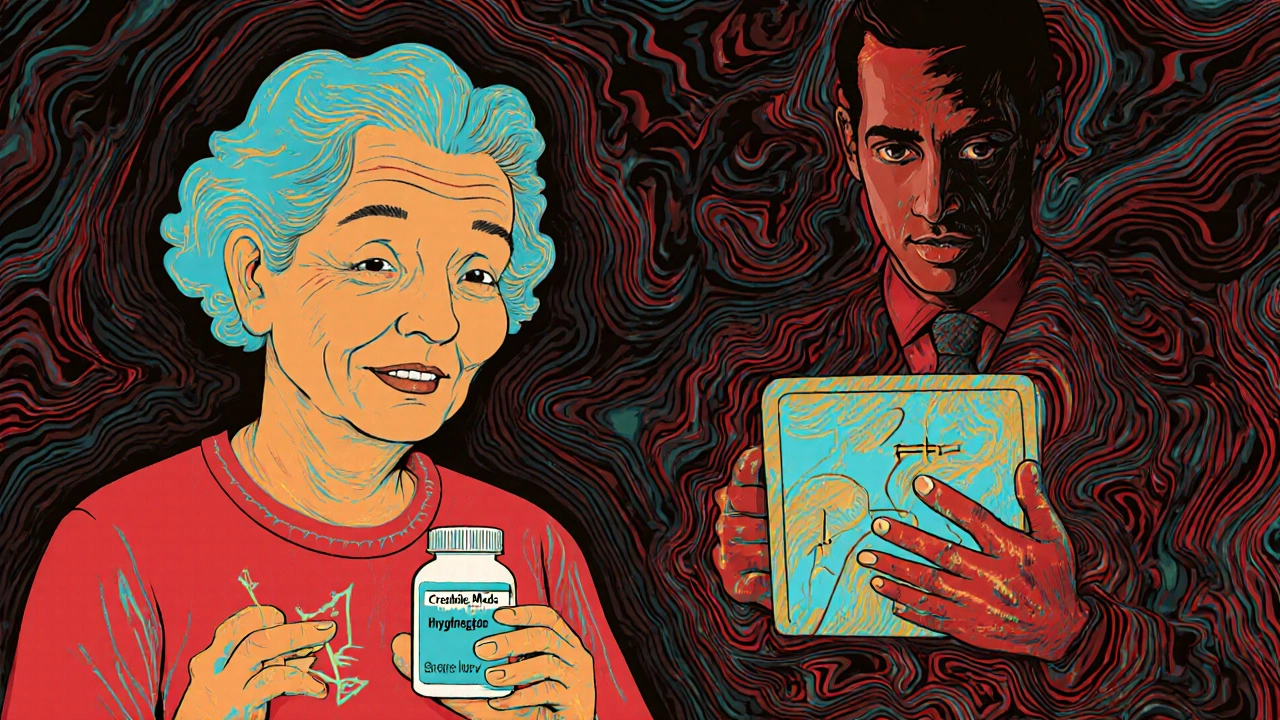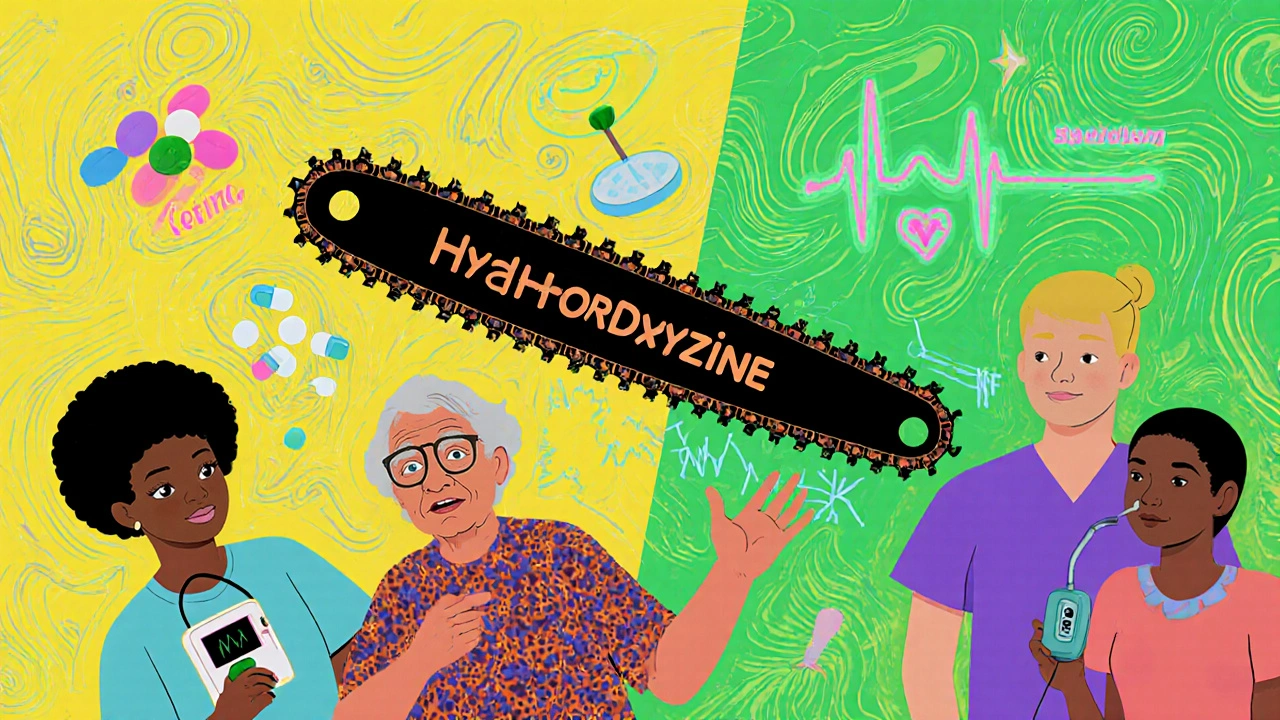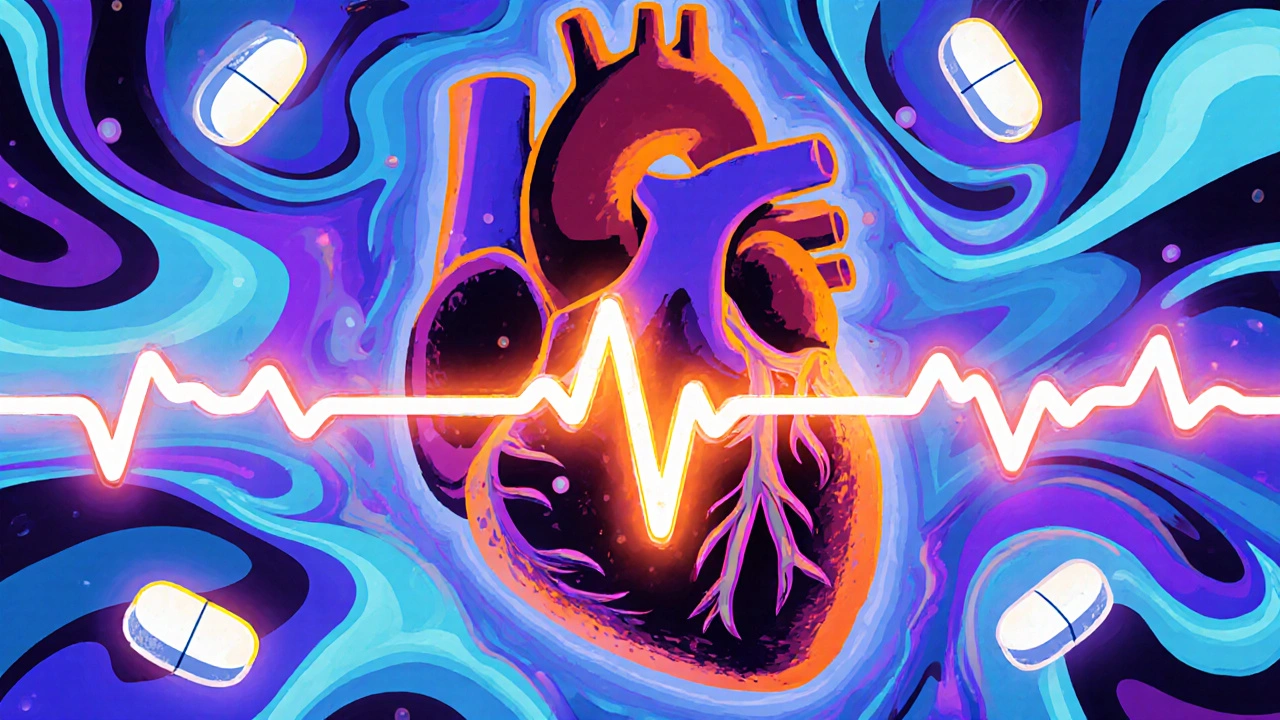Hydroxyzine QT Prolongation Risk Calculator
Risk Assessment
Hydroxyzine has been used for over 60 years to treat anxiety, itching, and nausea. It’s cheap, effective, and widely prescribed - especially for older adults and people with chronic skin conditions. But in recent years, doctors have started warning that this common antihistamine can quietly mess with your heart rhythm. The risk? QT prolongation - a potentially deadly electrical glitch in the heart that can trigger a dangerous arrhythmia called Torsade de Pointes.
What Exactly Is QT Prolongation?
Your heart beats because of electrical signals. The QT interval on an ECG measures how long it takes for the heart’s lower chambers to recharge after each beat. If that interval gets too long, the heart can misfire, leading to a chaotic, rapid rhythm. In rare cases, this can cause fainting, seizures, or sudden cardiac arrest. It’s not common - but when it happens with hydroxyzine, it’s often unexpected.Hydroxyzine blocks a specific potassium channel in heart cells called hERG. This isn’t unique to hydroxyzine - some antibiotics, antidepressants, and antipsychotics do the same thing. But unlike those drugs, hydroxyzine has long been considered "safe" because it’s an antihistamine. That’s the problem. People assume if it’s sold over-the-counter in similar forms (like diphenhydramine), it must be harmless. It’s not.
Who’s at Risk?
The risk isn’t the same for everyone. Hydroxyzine is generally safe in healthy young adults with no other medical issues. But for others, even a single 25 mg dose can be dangerous.- People over 65: Their kidneys and liver clear the drug slower, so it builds up. The European Medicines Agency now limits the daily dose to 50 mg for seniors.
- Those with existing heart conditions: Structural heart disease, prior arrhythmias, or a history of fainting without cause raise the risk.
- People with low potassium or magnesium: Common in diabetics, those on diuretics, or people with poor nutrition. These electrolytes help stabilize heart rhythm. Low levels + hydroxyzine = higher chance of trouble.
- People taking other QT-prolonging drugs: This is the biggest red flag. Combining hydroxyzine with amiodarone, certain antidepressants like citalopram, or even some antibiotics like azithromycin can multiply the risk.
- People with genetic long QT syndrome: Many don’t know they have it until something like hydroxyzine triggers a cardiac event.
A 2022 case report in Cureus described a 68-year-old woman with no heart history who went into Torsade de Pointes after taking 50 mg of hydroxyzine for anxiety. She was also on amiodarone - a known dangerous combo. She survived, but only because she got emergency treatment in time.
Dosing Matters - A Lot
The old maximum daily dose for hydroxyzine was 300 mg. That’s gone. Today’s guidelines are strict:- Adults: Max 100 mg per day
- Elderly (65+): Max 50 mg per day
- Children: 2 mg per kg of body weight, up to 40 kg
Even within these limits, the risk isn’t zero. One study found Torsade de Pointes occurred after doses as low as 12.5 mg - in people with hidden risk factors. That’s why doctors now check your ECG before prescribing hydroxyzine if you’re over 50 or have any risk factors. The QTc interval should be under 450 ms for men and 470 ms for women. If it’s higher, hydroxyzine should be avoided.

How Hydroxyzine Compares to Other Antihistamines
Not all antihistamines are created equal when it comes to heart risk.| Drug | Generation | QT Prolongation Risk | Typical Daily Dose |
|---|---|---|---|
| Hydroxyzine | First | Known Risk (CredibleMeds) | 50-100 mg |
| Diphenhydramine | First | Moderate Risk | 50-100 mg |
| Cetirizine | Second | Minimal Risk | 10 mg |
| Loratadine | Second | Minimal Risk | 10 mg |
| Fexofenadine | Second | Very Low Risk | 180 mg |
Second-generation antihistamines like cetirizine and loratadine barely affect the QT interval. They’re better choices for anxiety or itching, especially in older adults or people with heart concerns. Hydroxyzine and diphenhydramine are sedating - that’s why they’re used for sleep or nausea - but that sedation comes with a hidden cost.
What Doctors Are Doing Differently Now
After the European Medicines Agency’s 2015 review, prescribing habits changed. In the U.S., prescriptions for hydroxyzine dropped by 30% between 2014 and 2022. Hospitals now have electronic alerts that block hydroxyzine orders if the patient has a QTc over 500 ms or is on another high-risk drug.Pharmacists are checking the CredibleMeds database before dispensing. That’s the official list that flags drugs with known Torsade risk. Hydroxyzine is on it. So are amiodarone, methadone, and some antifungals. If you’re on any of these, hydroxyzine shouldn’t be prescribed.
Doctors are also more likely to ask: "Do you have a family history of sudden cardiac death?" or "Have you ever passed out for no reason?" These questions weren’t standard 10 years ago. Now they are.

What You Should Do If You’re Taking Hydroxyzine
If you’re currently taking hydroxyzine, don’t stop cold turkey. Talk to your doctor. But here’s what to ask:- "Why am I on this drug? Is there a safer alternative?"
- "Have you checked my QT interval on an ECG?"
- "Am I on any other medications that could interact?"
- "Am I in a high-risk group?"
If you’re over 65, have kidney or liver problems, or take any heart, psychiatric, or antibiotic meds - your risk is higher. Ask about switching to cetirizine for itching or low-dose mirtazapine for anxiety and sleep. Both are safer and just as effective for many people.
If you feel your heart racing, fluttering, or skipping beats within an hour of taking hydroxyzine - stop the drug and get medical help. Don’t wait. That’s not just anxiety. That could be your heart trying to tell you something.
The Bigger Picture: Why This Matters
Hydroxyzine isn’t the only drug with hidden heart risks. But it’s one of the most common. Millions of prescriptions are still written each year - often by non-cardiologists who don’t think of antihistamines as cardiac threats.What’s changed is our understanding. We used to think: "It’s just an antihistamine." Now we know: "It’s a hERG blocker with a narrow safety window."
The American Geriatrics Society now lists hydroxyzine as a "potentially inappropriate medication" for older adults. That’s a big deal. It means experts agree: the risks outweigh the benefits for most seniors.
And yet, it’s still prescribed. A 2021 survey of 127 hospital pharmacists found that 63% had seen hydroxyzine given to patients with two or more known risk factors - even though guidelines said not to.
This isn’t about fear. It’s about awareness. Hydroxyzine isn’t evil. It’s useful. But like a chainsaw, it needs respect. Use it without checking for risk factors, and you’re playing Russian roulette with your heart.
What’s Next?
Researchers are now looking at genetic factors. A 2023 study found that people who are "poor metabolizers" of the CYP2D6 enzyme - about 7% of the population - are over three times more likely to have QT prolongation on hydroxyzine. That means your genes might tell you if this drug is risky for you.There’s also a new drug in early trials called VH-01. It’s designed to work like hydroxyzine but without blocking the hERG channel. If it works, it could replace hydroxyzine entirely in the next decade.
For now, the message is simple: Hydroxyzine can be safe - but only if you’re screened properly. If you’re over 50, have any heart condition, take other meds, or feel your heart acting weird after taking it - talk to your doctor. Don’t assume it’s harmless because it’s been around for 70 years. We know better now.

Arup Kuri
They don't want you to know this but Big Pharma is hiding the truth about hydroxyzine. It's not just QT prolongation - it's a mind control experiment disguised as anxiety meds. I've seen people turn into zombies after taking it. They're testing it on seniors to see how fast the body shuts down. Wake up people.
Timothy Sadleir
The pharmacological implications of hERG channel inhibition by hydroxyzine are profound, particularly when considered within the context of polypharmacy in geriatric populations. One must acknowledge that the risk-benefit calculus has been fundamentally altered by emerging electrophysiological data.
Srikanth BH
Hey, just wanted to say this post is super helpful. If you're on hydroxyzine and feeling off, don't panic - just talk to your doc. There are better options out there, and you're not alone in this. Small steps matter.
Jennifer Griffith
so like... hydroxyzine is bad? but cetirizine is good? i thought they were the same thing lol
Roscoe Howard
The erosion of medical authority is evident when laypersons are encouraged to question the prescribing habits of physicians who have undergone over a decade of specialized training. This article, while superficially informative, contributes to a dangerous culture of pharmaceutical skepticism that undermines public health infrastructure.
Kimberley Chronicle
The CredibleMeds classification is a critical framework here. Hydroxyzine’s Class 2 risk (definite QT prolongation) is non-trivial, especially when combined with suboptimal renal clearance in elderly patients. We need standardized ECG screening protocols before initiation - not just after adverse events.
Shirou Spade
We treat drugs like toys. We say 'it's been around for 60 years' like that means safe. But time doesn't equal wisdom. It just means we didn't have the tools to see the damage until now. Maybe the real question isn't 'is this drug dangerous?' but 'why did we ignore the signs for so long?'
Patricia McElhinney
This article is dangerously misleading. The QT prolongation risk is statistically negligible compared to the benefits for anxiety and pruritus. You're scaring people away from a safe, affordable option because of cherry-picked case reports. If you're gonna write this stuff, at least cite actual population studies, not anecdotal Cureus papers.
Dolapo Eniola
America be like: 'oh hydroxyzine bad' but in Nigeria we use it for everything - sleep, anxiety, even kids with allergies. You guys overthink everything. God will protect you. 🙏
Agastya Shukla
The CYP2D6 poor metabolizer angle is fascinating. If genetic screening becomes routine, we could move from population-level warnings to precision prescribing. Imagine a future where your pharmacogenomic profile dictates your antihistamine choice - no more guesswork.
Pallab Dasgupta
I used to take this for sleep and thought I was fine - until one night my heart felt like it was trying to escape my chest. I thought I was having a panic attack. Turned out it was QT weirdness. Got an ECG. QTc was 498. They pulled me off it immediately. Bro. This ain't hype. This is real. Don't wait till it's too late.
Rachel Villegas
I'm glad this is getting more attention. My mom was on hydroxyzine for years and never knew the risks. She switched to loratadine and feels so much better - no more dizziness or heart flutters. It's not about fear, it's about being informed.
Emily Craig
so like... the same drug that makes you sleepy is also making your heart do the cha-cha? and we're just now figuring this out? wow. thanks america for your world class medical innovation
Srikanth BH
That's such an important story, Pallab. Thank you for sharing. You're right - it's not something you can ignore. I'm going to ask my doctor for an ECG next time I refill my script. Better safe than sorry.